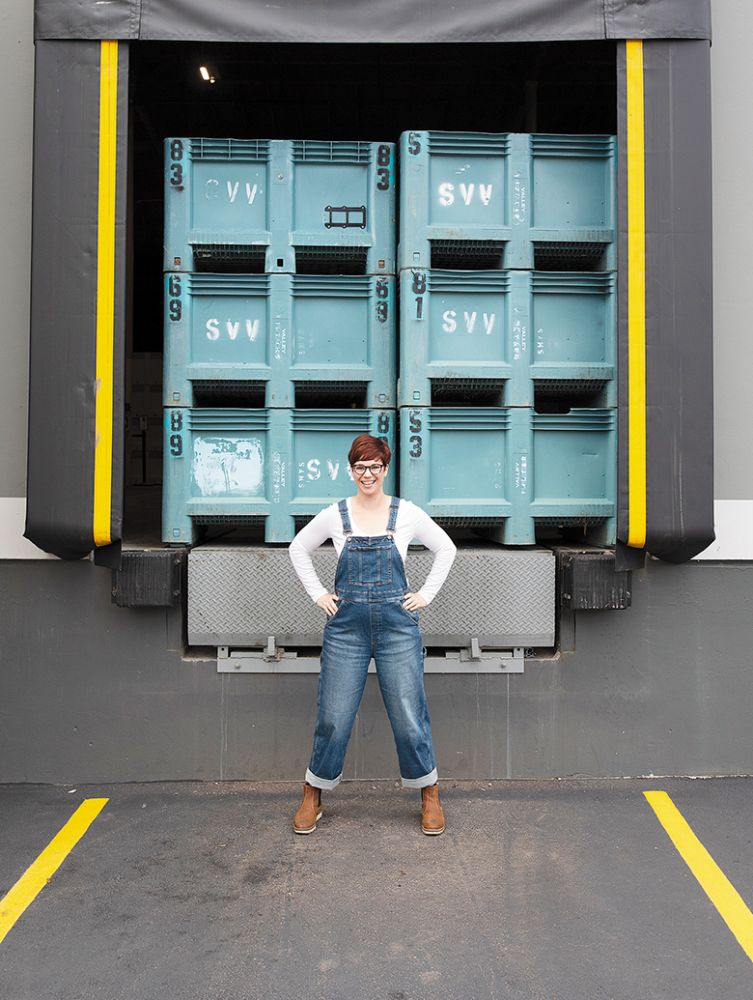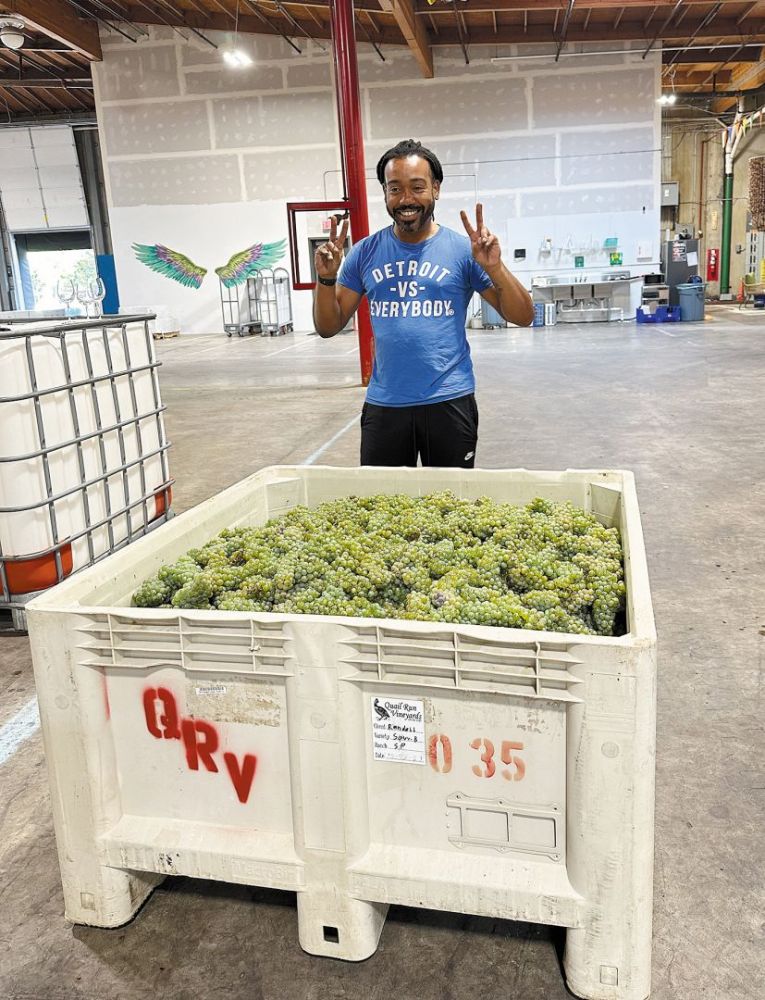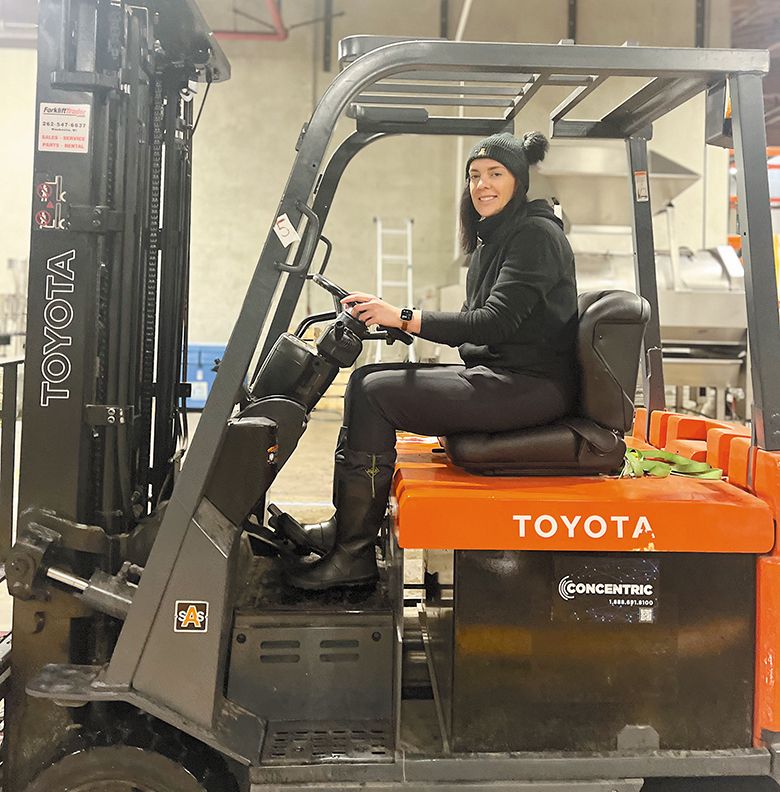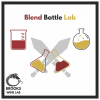Hatching New Talent
Learn about AVP Wine Collective’s incubator program



By Greg Norton
Rumbling semitrucks on a seemingly endless concrete landscape stretch alongside Highway 224. On the southeast edge of Portland, it feels far removed from the lush rows typically associated with winemaking. Tucked away in 60,000 square feet of a repurposed grocery warehouse, a revolution brews— not in the fermentation tanks, but within the winemaking culture. A bold initiative challenges traditions while forming new paths for winemakers in this predominantly white, male-dominated field.
Carrie Wynkoop founded AVP Wine Collective two years ago as a cooperative winery. AVP, Latin for “Alis Volat Propriis,” means “She flies with her own wings,” is Oregon’s state motto. Currently supporting 15 emerging brands (and related, space-intensive industry services), 40 percent of AVP’s resident winemakers are women, 30 percent identify as members of the LGBTQ+ community and 30 percent comprise people of color.
Small Passion
AVP emerged from Wynkoop’s enduring passion, previously manifested in Cellar 503, a wine club focused exclusively on bottles crafted by Oregon producers with modest case productions. AVP’s licensed and bonded facility features a comprehensive collection of winemaking equipment shared by resident wineries, as well as storage and fulfillment services for other wine, beer and makers of spirits.
“Small wineries are the foundation of the Oregon wine community,” affirms the AVP website. “We are supporting the next generation of winemakers with everything from crush to bottle— to make your wine your way.”
Wynkoop always envisioned an incubator program at AVP in order to nurture two or three new winemakers annually, providing technical mentoring, industry connections and the necessary infrastructure to successfully launch their own wine brands.
“I wanted to make sure the program was well-rounded,” recalls Wynkoop, contributing a “framework for not only making wine but building a successful business.”
Eyes Wide Open
“I think it’s a very big eye-opening experience,” observed veteran winemaker Cristina Gonzalez, the program’s self-described “Mother Hen” and owner of Gonzalez Wine Co. “You don’t need a lot of money to get started, but must have a lot of grit and the desire to really do it,” she added.
Preparing the way for winemakers who traditionally encounter the industry’s obstacles remains central to both women’s vision for the incubator. “We need more people from underserved communities in the wine industry,” said Gonzalez.
The incubator’s two participants, Jennifer Warner and Randall Coats, are concluding the inaugural year under the guidance of Wynkoop and Gonzalez, along with Corey Schuster, AVP’s winery director. They began last summer by tackling the details of wine’s legalities, licensing, sales and shipping. Gonzalez and
Schuster acquainted them with AVP’s equipment, safety protocols and the logistics of collaborating with other winemakers in the shared space.
Before long, they found fruit sources and made their first wines.
With harvest over and their wines headed into the bottle, they now focus on marketing and distribution. Both met with me to share their experiences.
Randall Coats
Wine 4 The People
After a decade in wine service and retail, Randall Coats believes production is the next logical step to expanding his knowledge and developing an innovative brand. “I want to keep it outside the box,” he said.
Coats moved to Oregon after working at Manhattan’s City Winery, the Pier 57 venue with an operational winery, restaurant and concert space. He became acquainted with our region through City Winery’s wine list, which naturally included Oregon Pinot Noir.
“Oregon was on the radar early,” he said, “well before I understood its importance in the wine world.”
Making wine accessible is part of the Detroit native’s vision for the industry’s future. His Midwestern roots shaped his decision to create a white wine using Cabernet Franc, which he calls “Michigan’s go-to grape.” He also produced a Sauvignon Blanc, satisfying his “nerdy side” since the crossing of the two varieties resulted in Cabernet Sauvignon.
The two wines are the initial offerings of his new Wine 4 The People brand.
Jennifer Warner
Dagger Daisy
daggerdaisy.com
Jennifer Warner, a natural entrepreneur, has founded three previous businesses. However, AVP’s incubator inspired her to write her first business plan. The transition from business consulting to creating and marketing a product compelled her to sharpen her pencil.
The Wisconsin native moved to Oregon from Arizona a decade ago. Her initial passion for fermentation was homebrewed cider. Restless after the COVID-19 pandemic shutdown, she enrolled at Chemeketa Community College near her home in Salem.
“I didn’t really have any intentions on making wine, and then this opportunity arose,” she remembers. “This [incubator] sounds really cool,” she said, “So I applied… and here I am.”
For her Dagger Daisy label, Warner made a Sauvignon Blanc and a rosé of Pinot Noir. “I wanted to use varieties I really like,” she explained.
She bought Pinot Noir grapes from a man who had recently purchased a home with a small vineyard. “It was his first year selling fruit,” she recalls, “so it worked out really well. We kind of learned together.”
Coats and Warner agree winemaking proved more challenging than they initially expected, as each juggled its demands with other work commitments. The mentorship of Wynkoop, Gonzalez and Schuster, along with the informal support of AVP’s other winemakers, supplied a wealth of information. Coats appreciated how “everyone is more understanding of when situations impact what you’re doing here.”
“I think collective spaces will increase in importance as the industry continues to evolve,” said Wynkoop. “Around here, we’re really focused on the support issue. We are creating a really intentional community,” she continued. “I think those qualities carry over and can impact the wine industry as a whole.”
Greg Norton is a freelance writer in the Pacific Northwest with a broad background in nonprofit communications and the arts. He studied journalistic writing through the UCLA Extension and has traveled to wine regions around the world. Greg is a Certified Specialist of Wine and received the level two award from the Wine and Spirits Education Trust. When not writing about wine, he can be found pouring it in a tasting room or wine bar near West Linn, where he lives. Read more by Greg at www.onthevine.blog.










